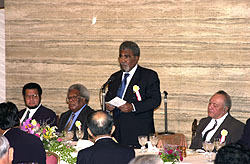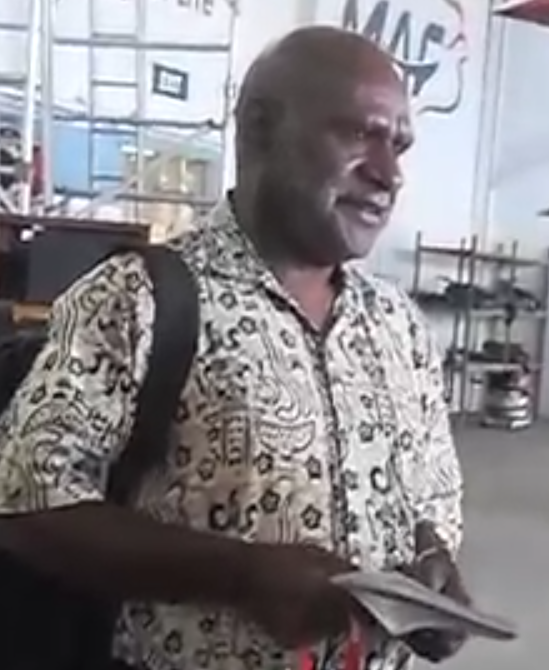|
Papua New Guinea Party
The Papua New Guinea Party is a political party in Papua New Guinea. It was founded in 2007 by former Prime Minister and Leader of the People's Democratic Movement, Mekere Morauta, along with MP Wake Goi. The party won 8 out of 109 seats in the 2007 General Election. With this result, the party became the largest opposition party. When Morauta stepped down from the leadership of the opposition and of the party in May 2010, Belden Namah was elected to succeed him in both positions. In August 2011, following a change in government, Namah became Deputy Prime Minister under PM Peter O'Neill, as part of a coalition government. By January 2012, the party's parliamentary membership had increased to 25, as members of smaller parties joined. The party has 3 members in the 113-seat National Parliament of Papua New Guinea The National Parliament of Papua New Guinea is the unicameral national legislature in Papua New Guinea. It was created in 1964 as the House of Assembly of Papua an ... [...More Info...] [...Related Items...] OR: [Wikipedia] [Google] [Baidu] |
Belden Namah
Belden Namah (born 30 December 1969) is a Papua New Guinea politician. He is a Member of the National Parliament of Papua New Guinea for the Papua New Guinea Party, representing Vanimo-Green since 2007. He served in Cabinet from 2007 to 2010 and as Deputy Prime Minister from 2011 to 2012. From 2012, he was an important member of the Parliamentary opposition. After retaining his seat in the 2022 election, he rejoined the government benches. Military career Namah originates from Vanimo near the border of Indonesia. He joined the military and graduated from Australia's Royal Military College Duntroon. He received training for a Special Forces Unit (SFU). During the Sandline affair he played a major role as one of the five PNG Defence Force officers who captured Tom Spicer, the leader of the mercenaries. The Sandline company of mercenaries were hired by the PNG government to recapture the Panguna mine on Bougainville island and quell the insurrection there. The SFU refused to c ... [...More Info...] [...Related Items...] OR: [Wikipedia] [Google] [Baidu] |
Mekere Morauta
The Right Honourable Sir Mekere Morauta (12 June 1946 – 19 December 2020) was a Papua New Guinean politician and economist who served as the 7th Prime Minister of Papua New Guinea from 1999 to 2002. Inheriting a depressed economy and a fractious legislature, he embarked on fundamental reforms of the country's economy and political system. Before entering politics, Morauta led the post-independence process of building financial infrastructure in Papua New Guinea as Secretary of Finance, Managing Director of the state-owned Papua New Guinea Banking Corporation, and Governor of the central bank. As a member of parliament, he represented Port Moresby North West from 1997 until 2012, and again from 2017 until his death in 2020. Morauta remained an active opposition leader during the successive governments of Sir Michael Somare and Peter O'Neill, especially focusing on the politics of natural resources. Personal background Sir Mekere was born in 1946 in Kukipi, a coast ... [...More Info...] [...Related Items...] OR: [Wikipedia] [Google] [Baidu] |
Wake Goi
Wake Goi (born 6 October 1968) is a Papua New Guinea politician. He was a member of the National Parliament of Papua New Guinea from 2007 to 2012, representing the electorate of Jimi Open. In 2007, he defeated Francis Kunai, who had been the member for the seat since 2002. In August 2011, Peter O'Neill became Prime Minister in the wake of a parliamentary motion of no confidence in the government of Acting Prime Minister Sam Abal (standing in for Sir Michael Somare Sir Michael Thomas Somare (9 April 1936 – 26 February 2021) was a Papua New Guinean politician. Widely called the "father of the nation" (), he was the first Prime Minister after independence. At the time of his death, Somare was also the lo ... while the latter was hospitalised for a heart condition). O'Neill appointed Goi as his Minister Assisting the Prime Minister on Constitutional Matters. [...More Info...] [...Related Items...] OR: [Wikipedia] [Google] [Baidu] |
National Parliament Of Papua New Guinea
The National Parliament of Papua New Guinea is the unicameral national legislature in Papua New Guinea. It was created in 1964 as the House of Assembly of Papua and New Guinea but gained its current name after the nation was granted independence in 1975. The 111 members of parliament serve five-year terms, 89 of whom are chosen from single-member "open" electorates, which are sometimes referred to as "seats" but are officially known as constituencies. The remaining 22 are chosen from single-member provincial electorates: the 20 provinces, the autonomous province of Bougainville (North Solomons), and the National Capital District. Each provincial member becomes governor of their province unless they take a ministerial position, in which case the governorship passes to an open member of the province. From 1964 until 1977 an Optional Preferential Voting System was used. The first past the post system was used from 1977 until 2002. Electoral reforms introduced by former Prime Minist ... [...More Info...] [...Related Items...] OR: [Wikipedia] [Google] [Baidu] |
Political Party
A political party is an organization that coordinates candidates to compete in a particular country's elections. It is common for the members of a party to hold similar ideas about politics, and parties may promote specific political ideology, ideological or policy goals. Political parties have become a major part of the politics of almost every country, as modern party organizations developed and spread around the world over the last few centuries. It is extremely rare for a country to have Non-partisan democracy, no political parties. Some countries have Single-party state, only one political party while others have Multi-party system, several. Parties are important in the politics of autocracies as well as democracies, though usually democracies have more political parties than autocracies. Autocracies often have a single party that governs the country, and some political scientists consider competition between two or more parties to be an essential part of democracy. Part ... [...More Info...] [...Related Items...] OR: [Wikipedia] [Google] [Baidu] |
Papua New Guinea
Papua New Guinea (abbreviated PNG; , ; tpi, Papua Niugini; ho, Papua Niu Gini), officially the Independent State of Papua New Guinea ( tpi, Independen Stet bilong Papua Niugini; ho, Independen Stet bilong Papua Niu Gini), is a country in Oceania that comprises the eastern half of the island of New Guinea and its offshore islands in Melanesia (a region of the southwestern Pacific Ocean north of Australia). Its capital, located along its southeastern coast, is Port Moresby. The country is the world's third largest island country, with an area of . At the national level, after being ruled by three external powers since 1884, including nearly 60 years of Australian administration starting during World War I, Papua New Guinea established its sovereignty in 1975. It became an independent Commonwealth realm in 1975 with Elizabeth II as its queen. It also became a member of the Commonwealth of Nations in its own right. There are 839 known languages of Papua New Guinea, one of ... [...More Info...] [...Related Items...] OR: [Wikipedia] [Google] [Baidu] |
People's Democratic Movement
The People's Democratic Movement is a political party in Papua New Guinea. It was founded by Paias Wingti in 1985, after his faction left the Pangu Party. Wingti served as prime minister from 1985 to 1988 and from 1992 to 1994. He was later replaced as leader by Mekere Morauta who also served as prime minister during his leadership of the PDM from 1999 to 2002. The party won 13 of 109 seats at the 2002 general election. It became the second largest party in Parliament, but the largest party, the National Alliance Party led by Michael Somare formed the government. The PDM joined the opposition in the National Parliament. Before the 2007 general elections, Morauta lost the leadership of the party and founded his own party, the Papua New Guinea Party, while Wingti became the leader of the PDM again. At the 2007 general elections, the PDM was heavily defeated, winning 5 seats in Parliament. Wingti was among those who lost their seats, and Morauta’s new Papua New Guinea Party became ... [...More Info...] [...Related Items...] OR: [Wikipedia] [Google] [Baidu] |
2007 Papua New Guinean General Election
General elections were held in Papua New Guinea from 30 June 2007 to 14 July 2007.Voting in PNG elections draws to close , 14 July 2007. For the first time, the election did not use (which has in the past resulted in a very volatile political system, with the election of a candidate being largely a matter of chance due to the large number of candidates), but rather Limited Preferential Voting, i ... [...More Info...] [...Related Items...] OR: [Wikipedia] [Google] [Baidu] |
Peter O'Neill
Peter Charles Paire O'Neill (born 13 February 1965) is a Papua New Guinean politician who served as the seventh Prime Minister of Papua New Guinea from 2011 to 2019. From 2002 until the present he served as Member of Parliament for Ialibu-Pangia. He occupied several positions as a Cabinet minister before being elected as Prime Minister. He is the leader of the Papua New Guinea National Congress. Towards the end of his tenure, he avoided a vote of no confidence by resigning his position, and was succeeded by James Marape as prime minister. O'Neill won the Ialibu-Pangia seat in 2022 in the first round with a large majority. This is unusual in PNG politics. Early life O'Neill was born on 13 February 1965 in Pangia, Territory of Papua, in the present-day Southern Highlands Province. His father, Brian O'Neill, was a magistrate of Irish Australian descent, while his mother, Awambo Yari, was of Papua New Guinean descent from the Southern Highlands. O'Neill's father moved to Papua Ne ... [...More Info...] [...Related Items...] OR: [Wikipedia] [Google] [Baidu] |
2007 Establishments In Papua New Guinea
7 (seven) is the natural number following 6 and preceding 8. It is the only prime number preceding a cube. As an early prime number in the series of positive integers, the number seven has greatly symbolic associations in religion, mythology, superstition and philosophy. The seven Classical planets resulted in seven being the number of days in a week. It is often considered lucky in Western culture and is often seen as highly symbolic. Unlike Western culture, in Vietnamese culture, the number seven is sometimes considered unlucky. It is the first natural number whose pronunciation contains more than one syllable. Evolution of the Arabic digit In the beginning, Indians wrote 7 more or less in one stroke as a curve that looks like an uppercase vertically inverted. The western Ghubar Arabs' main contribution was to make the longer line diagonal rather than straight, though they showed some tendencies to making the digit more rectilinear. The eastern Arabs developed the digit fr ... [...More Info...] [...Related Items...] OR: [Wikipedia] [Google] [Baidu] |
Political Parties Established In 2007
Politics (from , ) is the set of activities that are associated with making decisions in groups, or other forms of power relations among individuals, such as the distribution of resources or status. The branch of social science that studies politics and government is referred to as political science. It may be used positively in the context of a "political solution" which is compromising and nonviolent, or descriptively as "the art or science of government", but also often carries a negative connotation.. The concept has been defined in various ways, and different approaches have fundamentally differing views on whether it should be used extensively or limitedly, empirically or normatively, and on whether conflict or co-operation is more essential to it. A variety of methods are deployed in politics, which include promoting one's own political views among people, negotiation with other political subjects, making laws, and exercising internal and external force, including wa ... [...More Info...] [...Related Items...] OR: [Wikipedia] [Google] [Baidu] |



